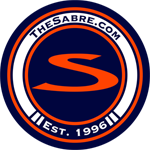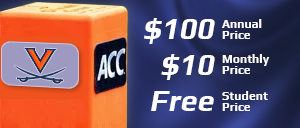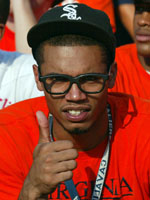 |
|
Mike Scott hamming it up at a UVa Football game. |
James Michael Scott, known by most Virginia fans as Mike, received great news in early May – the Atlantic Coast Conference approved his medical hardship waiver request for a fifth year of eligibility. While a relief, the news came as no surprise because the coaching and training staffs had done their homework regarding the maximum number of games Scott could play during the 2010-11 season.
Before Scott endured problems with his ankle, eventually leading to season-ending surgery, he was having the best season of his career. In the 10 games Scott played last season, he contributed six double-doubles and averaged 16 points and 10 rebounds per game. Scott currently has 963 points and 679 rebounds in his career at Virginia. He has 24 career double-doubles, ranking him eighth all time for Virginia. He’s also the only Cavalier since Ralph Sampson to accumulate five consecutive double-doubles; Scott accomplished that feat prior to his injury last season.
Scott’s production through 10 games represented an All-ACC type of season and the team had started to perform remarkably well as the calendar turned to December. Scott’s performances, and the emergence of key senior leaders in Mustapha Farrakhan and Will Sherrill, elevated Virginia to a solid team a lot sooner than many expected. Virginia had knocked off Oklahoma in the Maui Invitational and had won road games against Minnesota and Virginia Tech. The team was starting to gel and many believed the Cavaliers might have a shot at postseason play. Scott’s injury, however, ended his season and Sherrill missed several weeks after he broke his leg at Minnesota.
The setback was nothing new to Scott, who has faced challenges throughout his basketball journey. While playing at Deep Creek High School in Chesapeake, Va., Scott didn’t get much notice from top basketball recruiters early. Former Temple coach John Chaney was one of the only Division I basketball coaches to offer Scott a full ride. But when Chaney retired in 2006, Scott backed out of his commitment and decided to hone his skills after his senior year by playing for Boo Williams’ AAU team, which included superstars Chris Wright (Georgetown), Ed Davis (North Carolina) and Patrick Patterson (Kentucky).
Playing with the likes of Davis and Patterson helped Scott understand how the game was played at that level. It also helped him realize that he could play on that stage. A strong performance at the Southern Invitational (played on UVa’s Grounds) helped Scott break through and get noticed by other D-I programs. In one game, he outshined both Patterson and Davis. Shortly after that performance, Virginia coaches started to reach out to Scott.
With recruiters starting to catch on, Scott decided to play for Coach Kevin Keatts at Hargrave Military Academy to further expand his college options. There he teamed up with future Virginia Tech post player Jeff Allen . Scott finished his post-grad year at Hargrave by averaging 24 points, eight rebounds and seven assists per game. Scott further developed his skills there by playing with and against some of the best talent in the country. Allen became the only post-grad player to be ranked ahead of Scott that year by most recruiting analysts; they were No. 1 and No. 2 respectively. Basketball recruiting guru Bob Gibbons said that if recruiting rankings for seniors included post-grad players, he would have ranked Scott No. 33 overall nationally.
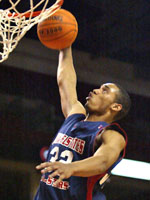 |
|
Scott earned All-Tournament Honors for his play in the Capital Classic All-Star game. |
Scott also suffered through tendonitis in his left knee while at Hargrave Military Academy, but that didn’t stop him from finishing the season strong and participating in the Capital Classic All-Star game in Maryland. Even with knee trouble, Scott put in a fantastic performance there, scoring 25 points on 11-of-17 shooting while pulling down 9 rebounds for the U.S. All Stars. His efforts earned him All-Tournament honors.
Immediately following Scott’s year at Hargrave, Recruiting Handbook and PrepStars.com editor Rob Harrington said, “When everyone saw Hargrave this year, [Scott] was the one who really stood out. He outplayed some of the guys who were supposed to be better than him. He played well last summer. In the Peach Jam for Boo Williams, he was the surprise for them that week. To me, he became a top 100 player at that point but he needed to prove it for more than just a couple of days. He proved it during the season. He could be a really big surprise.”
That development into a potential recruiting “surprise” didn’t come easy. Scott, who bloomed late as a basketball star in part because he didn’t start growing much until after the ninth grade, credits much of his development to hard work, structure and discipline brought on by his father and mentor, Michael H. Scott, a retired Marine Corps instructor. Scott’s father instructed Marine Corps personnel at Parris Island (SC), Quantico (VA) and Camp Pendleton (CA). That forced Mike to move from Virginia at age 6 to Oceanside, California, until his father retired in 1998 after 20 years of active duty service. The Scott family returned to Virginia that year and has remained ever since.
Still, the potential recruiting surprise did not immediately take hold at UVa. Scott battled some ankle problems early in his Cavalier career and then Virginia decided to part ways with coach Dave Leitao. That meant Scott would face new challenges as a Hoo and that he would need some more of that hard work and discipline. While Scott was playing fairly well before the coaching change, staying focused on working hard helped him become an even more dynamic player for the team under the tutelage of assistant coaches Jason Williford and Ron Sanchez.
“He was a strong kid from the start,” Williford said. “We worked on trying to get him to play stronger in the post, especially with his jump hooks. We tried to get him to use the left hand more. He’s almost become automatic with that 15- to 17-foot jump shot.”
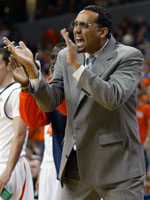 |
|
Assistant Coach Jason Williford is Scott’s primary position coach and an emotional leader on the bench. |
Williford continued: “Mike has a big time skill set. He can handle it a little bit. He can shoot it. He can pass it. He’s athletic. He’s got very good skill for his size and the ability to facilitate from the post and make plays with the ball in his hands. Sometimes he gets a little loose and we have to rein him in. But the ability within the post to read the double teams and hit the shooters, he’s probably going to demand a lot of attention next year which will free up [his teammates] to make some shots.
“This [past] year KT [Harrell] and Joe [Harris] were really good early on because of Mike being on the floor – they were able to get better looks. Toward the middle and end of the year when Mike was not with us, those guys shot a ton of contested shots. Hopefully [next season] we can play inside-out. And Mike is definitely not Junior Burrough, who I played with. He will at least pass it back out. Junior never saw a shot he didn’t like.”
Last season’s injury situation, as Williford noted, not only temporarily halted Scott’s development as rehab loomed, it also created challenges for his teammates. Through the injury issue, surgery, and rehab as well as the team’s struggles for a break-out season, however, Scott has enjoyed his time in college and remained positive. He has embraced his role as a leader, even when sitting the bench throughout an up and down season last year.
“He was great,” Williford said. “He was actually another coach. You could see him talking to the guys, especially with Assane [Sene] and Akil [Mitchell]. He was in their ear, ‘You should do this, you should do that.’ And hopefully he got a chance to see and learn how he can improve sitting there watching. I know it had to be tough.”
While it had to be tough then, Scott no longer has to sit and watch. He’s back in orange and blue with a chance to finish some unfinished business. For starters, James Michael Scott will earn his degree this fall – he has just one course requirement left to fill. But regardless of his accomplishments and the good times he has shared with his coaches and teammates, he still has one mission left to fulfill. Get his team to the NCAA Tournament.
There’s no doubt that the presence of Mike Scott on the floor next year and a roster loaded with talent and experience at every position will enhance the level of play from the team. That should give them every opportunity to make a run at the dance. Enjoy the interview.
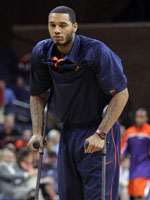 |
|
Scott on crutches following his second ankle surgery last season. |
 Mike Ingalls: You recently got the good news from the ACC that your medical hardship waiver was approved. Was there ever a shadow of doubt that it might not be approved?
Mike Ingalls: You recently got the good news from the ACC that your medical hardship waiver was approved. Was there ever a shadow of doubt that it might not be approved?
Mike Scott: No, because Ethan Saliba and Coach Bennett came up with all of the right information. I was just anxious for them to come back to me [with the approval].
 Mike Ingalls: You experienced the high ankle sprain preparing for your first collegiate season. How did it happen?
Mike Ingalls: You experienced the high ankle sprain preparing for your first collegiate season. How did it happen?
Mike Scott: It was actually during one of UVa’s camp where the freshmen got to play in it. That’s when I sprained my ankle. I think I stepped on somebody’s foot and rolled it – sprained it real bad.
 Mike Ingalls: It was rumored you added about 20 pounds between your senior year of high school and the time you left Hargrave. Was this good weight or bad weight, and do you think it contributed to the injury?
Mike Ingalls: It was rumored you added about 20 pounds between your senior year of high school and the time you left Hargrave. Was this good weight or bad weight, and do you think it contributed to the injury?
Mike Scott: Now that I think about it, it probably did [contribute to the injury]. My dad said the same thing – maybe I put too much weight on and my body wasn’t used to moving around with all of that weight. It’s probably one of the factors. But I also just happened to step on somebody’s foot.
 Mike Ingalls: How did the year at Hargrave affect you? Did it help your ability to play at the ACC level as well as deal with your classroom responsibilities?
Mike Ingalls: How did the year at Hargrave affect you? Did it help your ability to play at the ACC level as well as deal with your classroom responsibilities?
Mike Scott: It definitely helped with time management and classroom responsibilities. But I don’t think anything can prepare you for the ACC without playing [at that level]. Playing with good competition at Hargrave was very helpful, but nothing compares to the ACC.
 Mike Ingalls: But I would expect it helped better than what you experienced at the regular high school level, correct?
Mike Ingalls: But I would expect it helped better than what you experienced at the regular high school level, correct?
Mike Scott: Oh yeah, definitely. I played against Michael Beasley’s team at Oak Hill, so we played against good competition.
 Mike Ingalls: You had a knee problem at one point prior to playing in the Cap Classic. Was this also a result of the added weight? How are your knees now?
Mike Ingalls: You had a knee problem at one point prior to playing in the Cap Classic. Was this also a result of the added weight? How are your knees now?
Mike Scott: I had this thing called jumper’s knee. I guess it was tendonitis in my left knee, because I jump off that leg.
 Mike Ingalls: Was this also a result of the added weight?
Mike Ingalls: Was this also a result of the added weight?
Mike Scott: No, that bothered me before I got to Hargrave and during the time I was at Hargrave.
 Mike Ingalls: Does it still bother you?
Mike Ingalls: Does it still bother you?
Mike Scott: Sometimes.
 Mike Ingalls: Did college training help this at all?
Mike Ingalls: Did college training help this at all?
Mike Scott: A little bit. Just taking a lot of stress off my knees with the different ways we switch up our strength training.
 Mike Ingalls: How much of your quickness and leaping ability did you lose because of the injury and weight gain?
Mike Ingalls: How much of your quickness and leaping ability did you lose because of the injury and weight gain?
Mike Scott: The weight gain, the ankle injury, it took away that explosiveness I used to have.
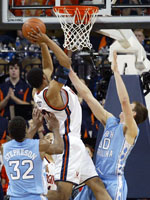 |
|
Scott jumping ability was limited as a freshman due to playing with a high ankle sprain. |
 Mike Ingalls: How frustrating was that for you your first year not being able to leap and do the things you did best in high school?
Mike Ingalls: How frustrating was that for you your first year not being able to leap and do the things you did best in high school?
Mike Scott: Very frustrating. Back then I was just going off of my athleticism and basically being quick and jumping – trying to out-jump people. It took that away. I had to find other ways to score and be productive.
 Mike Ingalls: Do you believe that the lack of explosiveness your freshman year helped you to focus on becoming a better all around player?
Mike Ingalls: Do you believe that the lack of explosiveness your freshman year helped you to focus on becoming a better all around player?
Mike Scott: Yeah. It helped me expand my game and be more than just, “all he can do is dunk, or all he can do is run and jump.” It helped me to become more versatile.
 Mike Ingalls: How much discomfort was there for you for the three seasons leading up to now? How healthy were you the last three years?
Mike Ingalls: How much discomfort was there for you for the three seasons leading up to now? How healthy were you the last three years?
Mike Scott: My sophomore and junior years my ankle did fine.
 Mike Ingalls: So besides your freshman year, you didn’t have any problems until this season?
Mike Ingalls: So besides your freshman year, you didn’t have any problems until this season?
Mike Scott: Yeah, loose pieces started swimming around in my ankle which basically gave me sharp pains every time I would try to walk or put pressure on it.
 Mike Ingalls: Have you ever been 100 percent healthy playing here at UVa in terms of mobility and strength in your ankle?
Mike Ingalls: Have you ever been 100 percent healthy playing here at UVa in terms of mobility and strength in your ankle?
Mike Scott: I think the end of my freshman year through my sophomore and junior years all the way up to early December my senior year, I was definitely 100 percent.
 Mike Ingalls: When you knew you had to go under the knife the first time, were you worried you might not end your career the way you had planned?
Mike Ingalls: When you knew you had to go under the knife the first time, were you worried you might not end your career the way you had planned?
Mike Scott: No, I didn’t think so because the doctors had told me – the way I thought – that it was just a quick scope to take the pieces out and stitch me back up and I would be right back out. And I was back out in five days. It was just a quick procedure – I didn’t think it was anything too crazy.
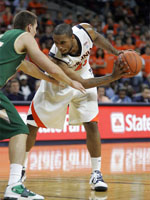 |
|
Scott has been one of the most versatile big men to suit up for the Cavaliers. |
 Mike Ingalls: But then you experienced more locking up. Did that concern you?
Mike Ingalls: But then you experienced more locking up. Did that concern you?
Mike Scott: The second time, after my surgery, I played the game against Seattle and the ankle felt fine, it was just that I felt a step slower – just trying to get back into basketball shape. I went home for Christmas and then came back and didn’t do anything over Christmas break. When I came back for practice, that’s when it did the same thing. They said more loose pieces had broke off, and that’s what really concerned me.
 Mike Ingalls: The second time around, did they open you up this time rather than just scoping?
Mike Ingalls: The second time around, did they open you up this time rather than just scoping?
Mike Scott: Yeah. This time they made sure they scraped everything out. The doctors didn’t put anything in, they just took something out that was bothering me. If anything, that’s going to help me get my ankle back stronger.
 Mike Ingalls: How’s the rehab and do you think you’re finally clear of loose fragments, at least enough to play to your potential?
Mike Ingalls: How’s the rehab and do you think you’re finally clear of loose fragments, at least enough to play to your potential?
Mike Scott: So far, knock on wood [knocks on the table], it’s been fine. Not really much ankle problems – I’m still getting the mobility and strength back in my ankle.
 Mike Ingalls: Where are you now with the rehab process? What are you able to do?
Mike Ingalls: Where are you now with the rehab process? What are you able to do?
Mike Scott: Basically everything. I can go all out. Now it’s basically just getting back shape. I’m playing and working out.
 Mike Ingalls: Are you expecting to play with some pain or discomfort? Or do you think you’re clear of having to deal with that?
Mike Ingalls: Are you expecting to play with some pain or discomfort? Or do you think you’re clear of having to deal with that?
Mike Scott: That’s a good question. Doctors said that nothing is certain. The doctor who did the surgery said that all of his patients haven’t had any problems with their ankles or injuries after the scope. But nothing is for certain. You never know.
 Mike Ingalls: After a surgery, because of intense rehab and focus on that area, a player can sometimes come back stronger than before. Do you think that’s possible for you?
Mike Ingalls: After a surgery, because of intense rehab and focus on that area, a player can sometimes come back stronger than before. Do you think that’s possible for you?
Mike Scott: I’m still rehabbing every day, so I hope so.
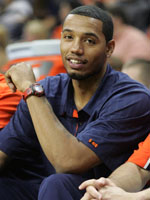 |
|
Scott has tried to keep a positive outlook, even when sidelined with his injury. |
 Mike Ingalls: It must have been tough on you having to sit and wait out the second half of the season. What went through your mind as you watched your teammates struggle in some ACC games and not being able to help?
Mike Ingalls: It must have been tough on you having to sit and wait out the second half of the season. What went through your mind as you watched your teammates struggle in some ACC games and not being able to help?
Mike Scott: It was tough. Even when we were winning I still wanted to be part of the team. Especially when we started losing, I knew I could contribute some way, some how, for us to win. Those games that we lost toward the end of the season were so close. For example, the Miami game – games like that where we didn’t finish. If we had just executed some plays and made free throws and less turnovers, it’s an easy game. [Against Miami] it’s 50 seconds and we’re up 10 points. All you have to do is make free throws and the game is yours.
 Mike Ingalls: Now that you’ve gone through the surgery process and the season is behind you, how excited are you that you have an opportunity to return for a fifth year with a solid and more experienced team around you?
Mike Ingalls: Now that you’ve gone through the surgery process and the season is behind you, how excited are you that you have an opportunity to return for a fifth year with a solid and more experienced team around you?
Mike Scott: It’s very exciting, very motivating. It gives you an extra push when you’re working out by yourself. You just think about all you missed and you have to come back and redeem yourself and redeem the program.
 Mike Ingalls: After some tough losses, you made some comments on social media sites about taking note for next season. What was that about?
Mike Ingalls: After some tough losses, you made some comments on social media sites about taking note for next season. What was that about?
Mike Scott: [laughing] Just a little mental note. I’m not much of a big talker about what I’m going to do, I was just making a little mental note and I’ll address it when it’s time.
 Mike Ingalls: With injuries to you and Will Sherrill, a good part of the season was lost for the team. Do your teammates have the same feeling as you, this desire to get back out there and take care of business, particularly knowing they have you to help them next season?
Mike Ingalls: With injuries to you and Will Sherrill, a good part of the season was lost for the team. Do your teammates have the same feeling as you, this desire to get back out there and take care of business, particularly knowing they have you to help them next season?
Mike Scott: I sure do hope so. I would think they would feel the same way since they were playing out there on the court. I would think they would be more passionate than I am since they were out there.
 Mike Ingalls: Coming into your senior year, you obviously were hungry to have a great season and maybe get into the postseason. You busted out of the gate with a double-double average before your surgery. How’s your hunger for your fifth year?
Mike Ingalls: Coming into your senior year, you obviously were hungry to have a great season and maybe get into the postseason. You busted out of the gate with a double-double average before your surgery. How’s your hunger for your fifth year?
Mike Scott: I think it’s worse [meaning stronger]. Going into your senior year, you know this is it, your last go-around. You want to just leave everything out on the court. After this past season I just think it’s going to be worse – I’m going to be scratching to get back on the court.
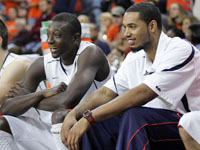 |
|
Scott did his best to keep his teammates loose while on the bench. |
 Mike Ingalls: On the sidelines the latter part of the year, you’ve been a great supporter of your teammates, particularly with trying to keep them loose and having fun. How have you been able to remain in good spirits dealing with the injury situation?
Mike Ingalls: On the sidelines the latter part of the year, you’ve been a great supporter of your teammates, particularly with trying to keep them loose and having fun. How have you been able to remain in good spirits dealing with the injury situation?
Mike Scott: I guess being one of the leaders on the team, you don’t want your teammates to know how your really feel or see you down. I think that when teammates see their leader down, they’re going to feel down and mess up their day. I just kept my spirits high and kept being a vocal leader. I’m not saying I was crying or tearing up on the inside, I just really wanted to be out there with my teammates. I didn’t want them to know that I was down or whatever.
 Mike Ingalls: Is there a level of expectation amongst you and your teammates to reach the NCAA Tournament?
Mike Ingalls: Is there a level of expectation amongst you and your teammates to reach the NCAA Tournament?
Mike Scott: That’s the one and only goal. Every year that’s the goal for every team that plays college basketball – to reach the NCAA Tournament.
 Mike Ingalls: When you and Will were healthy last year, the team’s level of play surprised many and you guys looked to have a legit shot at the NIT and possibly the NCAA tourney. Does that give you a barometer of sorts for this season and what you guys can accomplish?
Mike Ingalls: When you and Will were healthy last year, the team’s level of play surprised many and you guys looked to have a legit shot at the NIT and possibly the NCAA tourney. Does that give you a barometer of sorts for this season and what you guys can accomplish?
Mike Scott: We could have finished better in the standings. People weren’t counting on us winning with me, and especially without me. We proved them wrong. We should be able to finish high [next year], as one of the best teams in this league.
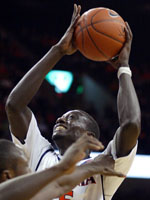 |
|
Assane Sene made the most of Scott’s absense on the floor, developing into an offensive threat to go with his already solid defensive talents. |
 Mike Ingalls: Talk about the improvement of Assane Sene and how that affects how you can play (i.e. your role with the team).
Mike Ingalls: Talk about the improvement of Assane Sene and how that affects how you can play (i.e. your role with the team).
Mike Scott: He definitely improved. He can catch. He’s been working hard after practice, having the managers throw the football at him – tennis balls, anything that he can do to work on his hand-eye coordination. Assane has gotten stronger. He’s catching and finishing. He’s taking time in the post. [In the past] he just sped up and thought too quickly about what he was going to do when he got the ball in the post. Now he just takes his time, catches and finishes. He makes his free throws. He did great toward the end of the season.
 Mike Ingalls: Are you going to teach him how to power dunk?
Mike Ingalls: Are you going to teach him how to power dunk?
Mike Scott: I think he knows. I’ve seen him in our four man groups do some dunks. I think he just has to have the confidence to do it [in games].
 Mike Ingalls: With Assane gaining confidence and productivity on the offensive end, do you think that could free you up more?
Mike Ingalls: With Assane gaining confidence and productivity on the offensive end, do you think that could free you up more?
Mike Scott: Going into next season, teams know how he finished. I’m pretty sure they’re still going to try to double team me, but they’re going to be cautious because all I have to do is dump the ball down and he’s going to catch and finish.
 Mike Ingalls: One of the big improvements for you from your junior year to your senior year was your ability to find open teammates quickly out of a double team. How did that take hold? Was it something you worked on specifically with coaches in the off-season?
Mike Ingalls: One of the big improvements for you from your junior year to your senior year was your ability to find open teammates quickly out of a double team. How did that take hold? Was it something you worked on specifically with coaches in the off-season?
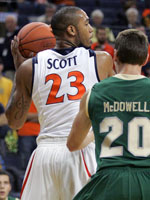 |
|
Scott has developed into a fantastic passer out of double teams. |
Mike Scott: Coach Williford has a drill where it’s a double team and you basically dribble out or pass out of the post. I think I’ve always been an unselfish player and wanting to make the next pass. This year it was [more obvious] because teams started to double team me. I’m not a black hole. I’m not going to try to force up any shots.
 Mike Ingalls: I guess it helped that you had strong perimeter shooters to pass out to this year, with guys like KT Harrell, Mustapha Farrakhan , Will Sherrill and Joe Harris . Next season you lose Will and Mu, but have everyone else back, plus Sammy (that you didn’t have when you were healthy this past season) and newcomers Malcolm Brogdon and Paul Jesperson . With double teams almost certain, is it nice knowing you have so many capable shooters to pass to?
Mike Ingalls: I guess it helped that you had strong perimeter shooters to pass out to this year, with guys like KT Harrell, Mustapha Farrakhan , Will Sherrill and Joe Harris . Next season you lose Will and Mu, but have everyone else back, plus Sammy (that you didn’t have when you were healthy this past season) and newcomers Malcolm Brogdon and Paul Jesperson . With double teams almost certain, is it nice knowing you have so many capable shooters to pass to?
Mike Scott: Oh yeah, definitely. Teams are not going to know what to do [next season]. [This past season] Will Sherrill was one of my favorites. He would be at the top of the key and I would be in the post. His man would come double team me and just leave him wide open.
 Mike Ingalls: You’ve bonded with James Johnson a bit this past season. What should we expect from JJ in the coming years?
Mike Ingalls: You’ve bonded with James Johnson a bit this past season. What should we expect from JJ in the coming years?
Mike Scott: He’s a physical nature. He’s a beast. That kid has all the God-given talent. I’m telling you, this guy wants to dunk everything. If he doesn’t dunk everything, he’s close to it. He’s very aggressive. He’s physical. He’s finesse. He can shoot, rebound and he runs the floor. He just needs to work on his defensive positioning with the pack defense. This upcoming summer and preseason is going to be important for James to get into that pack mode defense that Coach Bennett teaches.
 Mike Ingalls: There have been rumors that he’s unhappy and potentially considering a transfer. Can you put this issue to rest for us and is he excited about next year?
Mike Ingalls: There have been rumors that he’s unhappy and potentially considering a transfer. Can you put this issue to rest for us and is he excited about next year?
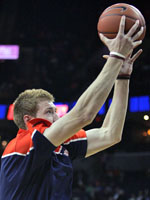 |
|
James Johnson will join Scott in the post this season. |
Mike Scott: Yeah. I don’t think he would be unhappy if he came to the coach and told him he wanted to redshirt. That would be confusing. It’s not like Coach said, “James, we’re going to redshirt you.” Everyone knew that he came in and talked to Coach Bennett about wanting to redshirt. It was his decision. He didn’t think he was ready mentally. It was just from the neck up, to try to get himself ready to play in a different type of league, a different type of environment – to separate himself from high school to college ball. I think he wanted to sit down and really work on that. He hadn’t really reached that point yet, but I think he’s reached it now and he’s getting better.
 Mike Ingalls: Do you think the team has enough fire power for Coach Bennett to allow you guys to take quicker shots or get out and run the floor more often?
Mike Ingalls: Do you think the team has enough fire power for Coach Bennett to allow you guys to take quicker shots or get out and run the floor more often?
Mike Scott: Coach Bennett allows us to run. He wants us to get out and run. But sometimes situations don’t allow that and you have to slow down and run your offense. That’s just what kind of system we’re in. I have no problem with it. I think it works.
 Mike Ingalls: A number of players have left the team over the past couple of years, including Will Regan and Billy Baron . Has this had much of an effect on the team?
Mike Ingalls: A number of players have left the team over the past couple of years, including Will Regan and Billy Baron . Has this had much of an effect on the team?
Mike Scott: It affected Joe [Harris], because Billy was Joe’s roommate. Joe was a little down. Akil was Regan’s roommate. But as a unity standpoint, you want to see those guys be successful in their future. You can’t really hang your head about it too long. You have to say your hi’s and goodbye’s.
 Mike Ingalls: So what was the situation that led to them transferring? Was it a playing time issue and they felt by leaving they would have a better opportunity elsewhere?
Mike Ingalls: So what was the situation that led to them transferring? Was it a playing time issue and they felt by leaving they would have a better opportunity elsewhere?
Mike Scott: It’s hard for every coach because every player wants to play and every coach wants to play every player, but sometimes it happens like that. You just have to learn that sometimes it makes you stronger [to wait your turn to play]. For example, Mustapha barely played his first and second years. That’s what made him so strong. And that’s not saying anything against Will and Billy, but Mu stayed and went through all of the trials and tribulations. It made him stronger.
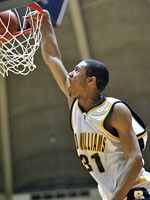 |
|
Scott put on a show at the Southern Invitational in 2006 while playing for Boo Williams’ AAU team. |
 Mike Ingalls: I first saw you at the Southern Invitational and my first photo of you was a baseline dunk that wowed the crowd. You were very active in that game and throughout the tourney. Was this your breakout summer? How much interest came your way after playing with Boo Williams that summer?
Mike Ingalls: I first saw you at the Southern Invitational and my first photo of you was a baseline dunk that wowed the crowd. You were very active in that game and throughout the tourney. Was this your breakout summer? How much interest came your way after playing with Boo Williams that summer?
Mike Scott: Yeah, that and it’s why I went to Hargrave for a year for exposure. After I got out of Temple situation, not a lot of colleges were on me that much. I think playing with Boo Williams and getting exposure and playing at Hargrave with Coach Keatts and one of the best prep school basketball teams in the nation – that exposure really helped me.
 Mike Ingalls: You mentioned Temple. You were committed to them? What happened?
Mike Ingalls: You mentioned Temple. You were committed to them? What happened?
Mike Scott: I had signed with them, actually. Going into my senior year I had already signed with Temple. Coach Chaney resigned, and that was the main reason I went there. When Fran Dunphy took the head coaching job, I told him I wanted to get out of the situation.
 Mike Ingalls: When did Virginia begin to show strong interest?
Mike Ingalls: When did Virginia begin to show strong interest?
Mike Scott: The Southern Invitational was the first time I ever heard from UVa, after that same game [the Boo Wiliams game mentioned earlier].
 Mike Ingalls: What other schools took an interest in you after you were released from your letter-of-intent with Temple?
Mike Ingalls: What other schools took an interest in you after you were released from your letter-of-intent with Temple?
Mike Scott: I remember Coach Capel, because he recruited me from VCU. He went to Oklahoma, but would still come back to Hargrave and say he was still interested. There were a lot of schools in the ACC interested. Duke and UNC obviously weren’t interested.
 Mike Ingalls: How much did it help your exposure to play on Boo’s team alongside so many talented stars?
Mike Ingalls: How much did it help your exposure to play on Boo’s team alongside so many talented stars?
Mike Scott: It helped a lot, because coaches were going to see top players like Ed Davis , Chris Wright and Patrick Patterson. They were showcasing their talent, and that’s what I was doing.
 Mike Ingalls: What about in terms of helping you elevate your game. Did it help to play together with those big names?
Mike Ingalls: What about in terms of helping you elevate your game. Did it help to play together with those big names?
Mike Scott: Yeah. Those were the top players in the country. It just heightens your game. You want to be on your toes and play just as well as those guys.
 Mike Ingalls: How close do you think Virginia was to landing Davis and Patterson? Since you played with both on Boo’s team, did you have conversations with them about attending UVa?
Mike Ingalls: How close do you think Virginia was to landing Davis and Patterson? Since you played with both on Boo’s team, did you have conversations with them about attending UVa?
Mike Scott: I think both of them were pretty close [to committing to Virginia]. When I was at Hargrave, I came to the Arizona game – the first game ever played in this building – Ed was sitting right next to me with Patrick in front of me and Mu next to him. We all thought we were coming here.
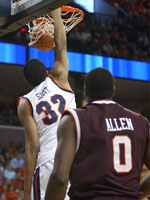 |
|
Scott has gotten the better of former Hargrave teammate Jeff Allen in head to head competition. |
 Mike Ingalls: The only post-grad player ranked ahead of you was VT’s Jeff Allen . You played with him at Hargrave and again against him in the Cap Classic. Were you two friends at that time? Has the rivalry with VT changed your relationship with him in any way?
Mike Ingalls: The only post-grad player ranked ahead of you was VT’s Jeff Allen . You played with him at Hargrave and again against him in the Cap Classic. Were you two friends at that time? Has the rivalry with VT changed your relationship with him in any way?
Mike Scott: I have no hard feelings for Jeff. I would call him a friend, but I don’t really talk to him that much. It’s that UVa-Virginia Tech rivalry – you don’t like them, they don’t like us.
 Mike Ingalls: So there was a sense of that rivalry before you two got college?
Mike Ingalls: So there was a sense of that rivalry before you two got college?
Mike Scott: Yeah, I felt some hate from him and Dorenzo. We used to go on Hargrave trips. One year we were at Carolina when Virginia Tech beat them when they were the No. 1 team in the nation – Tyler Hansbrough’s team. Oh my gosh , I heard it the whole bus ride back.
 Mike Ingalls: How did communication go throughout your careers? Did you guys communicate on the phone or through social media? Was there any pre-game or post game trash talking going on?
Mike Ingalls: How did communication go throughout your careers? Did you guys communicate on the phone or through social media? Was there any pre-game or post game trash talking going on?
Mike Scott: Not pre-game or post game. Probably a couple of weeks before. Me and Dorenzo. And on Facebook, everyone knows everyone. I’d be like, “Are you ready?” and they’d be like, “Are YOU ready?” “Yeah, I kill you every time, anyway.” Just little stuff like that.
 Mike Ingalls: Has the battle with Allen been a fun?
Mike Ingalls: Has the battle with Allen been a fun?
Mike Scott: [Laughing] For my part, it has been.
 Mike Ingalls: During your first year at UVa, you mentioned something in reference to VT that appeared you weren’t having as good a time as maybe Jeff Allen was.
Mike Ingalls: During your first year at UVa, you mentioned something in reference to VT that appeared you weren’t having as good a time as maybe Jeff Allen was.
Mike Scott: I remember, I said Seth Greenberg gives them more confidence to play. I said that after we lost to Virginia Tech. With that team, if they made a mistake, they got a [longer] leash.
 Mike Ingalls: Did you feel at the time you may have made a poor decision coming to Virginia?
Mike Ingalls: Did you feel at the time you may have made a poor decision coming to Virginia?
Mike Scott: Nah. Games like that you’re just frustrated and it’s tricky. Now that I’m older and wiser I know not to get too crazy in interviews. I was young and I was vulnerable, especially after a loss like that. I was just saying what was really on my mind.
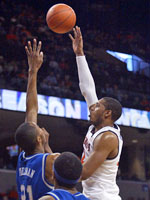 |
|
Scott has shown the ability to make a variety of shots. |
 Mike Ingalls: What was Coach Leitao like? He seemed to take a strong, militaristic approach to coaching.
Mike Ingalls: What was Coach Leitao like? He seemed to take a strong, militaristic approach to coaching.
Mike Scott: He was definitely old school. I think that was coming from working with Jim Calhoun. He had that Big East mentality to be the most physical, aggressive and well conditioned team. He was a perfectionist and wanted the best out of everyone.
 Mike Ingalls: Were there times when he ‘lost’ the team due to his overbearing style?
Mike Ingalls: Were there times when he ‘lost’ the team due to his overbearing style?
Mike Scott: I think there’s a thin line between trying to prove a point and taking care of your players. Sometimes there were certain things where you thought that it was – how can I say this … it was just …
For example, hard practices before a game – long, drawn out practices before a game. Those take a toll on your body – take a toll on your legs, ankles, knees, whatever. You know, Sammy has so many injuries, I have so many injuries, Assane has heel problems. I’m not saying this is all Coach Leitao’s fault, but I think it starts to take a toll on you. You start to get hurt.
 Mike Ingalls: With your background of having a military father and having gone through Hargrave, you probably had a thick enough skin to deal with Leitao’s strong disciplinary style. Was it a case of some players just not responding well to that approach?
Mike Ingalls: With your background of having a military father and having gone through Hargrave, you probably had a thick enough skin to deal with Leitao’s strong disciplinary style. Was it a case of some players just not responding well to that approach?
Mike Scott: You’re right, people respond differently to it. I’m not saying I didn’t listen to anything Coach Leitao said – it wasn-t like it went in one ear and out the other – I didn’t let it affect my game. I didn’t let him change the way I was going to play. I just felt it was motivation.
 Mike Ingalls: Do you think his methods helped some players play better? Jason Cain comes to mind.
Mike Ingalls: Do you think his methods helped some players play better? Jason Cain comes to mind.
Mike Scott: Yeah, it helped Jason Cain. Like I said, people respond differently to it. Some people can’t respond to it and shut down, some people respond to it in a positive way.
 Mike Ingalls: There were times when you disappeared on the court under Coach Leitao and other times you dominated. I think you mentioned in a post game interview that you sometimes lose your drive. What changed since then to make you the player you’ve been the past two years?
Mike Ingalls: There were times when you disappeared on the court under Coach Leitao and other times you dominated. I think you mentioned in a post game interview that you sometimes lose your drive. What changed since then to make you the player you’ve been the past two years?
Mike Scott: Most of it was from a mentality stand point, changing things from the neck up. Just being focused, locked in every possession of the game and not taking no plays off.
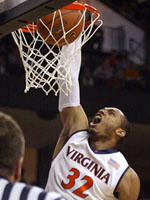 |
|
Scott became a more ascertive player over time. |
 Mike Ingalls: What caused you to focus better? Was it that you were running out of time with your collegiate career, maturity …?
Mike Ingalls: What caused you to focus better? Was it that you were running out of time with your collegiate career, maturity …?
Mike Scott: I think a little bit of both. You don’t want to say that just because I’m almost done with college, now I need to step it up. You should already be focused and locked in. But, that wasn’t my case. I think I just matured as the years went on.
 Mike Ingalls: You seemed to make a big leap from your sophomore to junior year in terms of agility and quickness. How much of that was the different style of conditioning that Mike Curtis brought the team?
Mike Ingalls: You seemed to make a big leap from your sophomore to junior year in terms of agility and quickness. How much of that was the different style of conditioning that Mike Curtis brought the team?
Mike Scott: [Curtis] focuses on how to get faster, quicker, more explosive – quick off the floor. He strengthens you for what you need to play basketball, basically. It’s different than what we were doing the past year. That’s why all of us made strides in different areas; quicker, faster, and stamina was pretty good.
 Mike Ingalls: Did you feel lighter on your feet the last two seasons?
Mike Ingalls: Did you feel lighter on your feet the last two seasons?
Mike Scott: Yeah, I felt lighter at some points, but toward the beginning of this year I had jumped up two pounds – I was like 242. It may not have looked like it on the court, but watching tape with Coach Bennett it seemed like I was slow off my feet. I think I definitely want to drop some pounds. I want to be lighter. It just seemed like I was a step slower.
 Mike Ingalls: You felt that way this past year, yet you were on pace to have your best season ever?
Mike Ingalls: You felt that way this past year, yet you were on pace to have your best season ever?
Mike Scott: Yeah [surprised tone]. Maybe I was just watching the bad. You know you have your highlight tape. Maybe I was watching my not-highlight tape [laughing].
 Mike Ingalls: Talk about those Mike Curtis workouts. Were they tough?
Mike Ingalls: Talk about those Mike Curtis workouts. Were they tough?
Mike Scott: Tough, that’s an understatement. He has the best workouts. Every workout he has is going to benefit you in some way. He’s not just thinking of stuff to torture you with. His workouts are definitely tough. They keep you stronger, keep you quicker and keep you faster, but they also put on weight that benefits you muscle-wise and not just fat.
 Mike Ingalls: Tell us about one of the more demanding workouts.
Mike Ingalls: Tell us about one of the more demanding workouts.
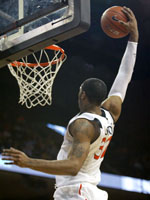 |
|
Strength and conditioning coach Mike Curtis’ workouts have helped Scott get the spring back in his step. |
Mike Scott: Isometric workouts that we just finished last month. After the season we take two weeks off and start back up. We have this thing called isometrics where it’s basically no weight – you’re not squatting, you’re not putting reps on the bench or doing a lot of arm curls. You just have a body weight vest and you’re doing regular things and holding stationary positions. For instance, if you’re doing push-up’s you’re just in that down position, but you’re not all the way down – you’re just holding stationary in an isometric position for about ten seconds. When the ten seconds are up, you do ten reps. There’s probably about seven exercises. You’ve got pull-up’s, lunges – different exercises. It’s very hard because it’s all body weight along with a weight vest.
 Mike Ingalls: I also heard that Curtis was having you guys run the steep hill at Washington Park. That seems like a tough workout as well.
Mike Ingalls: I also heard that Curtis was having you guys run the steep hill at Washington Park. That seems like a tough workout as well.
Mike Scott: That was tough – it was part of the conditioning we would do. First week we would start off running up the hill eight times. And they’re timed, too. You’re running at your own pace, but you have to be back at the finish line at the right time or it starts over. And each week it would go up – the next week we would go 10, the next we would go 12, all the way to 16.
 Mike Ingalls: When Coach Leitao was fired, did anyone from administration talk to the team and encourage you guys to hang in there and wait to see who the next coach would be?
Mike Ingalls: When Coach Leitao was fired, did anyone from administration talk to the team and encourage you guys to hang in there and wait to see who the next coach would be?
Mike Scott: Yeah, we all met with Mr. Littlepage and Mr. Oliver. They told us they were going to bring somebody in that we would feel comfortable with. They asked if we had any suggestions. They were real good about the situation.
 Mike Ingalls: Talk about that time frame when you have no head coach. What goes through your head and what are the players saying at that time?
Mike Ingalls: Talk about that time frame when you have no head coach. What goes through your head and what are the players saying at that time?
Mike Scott: We’re like, we don’t know what’s going on. We don’t know who’s going to be our coach. We hear all these rumors of who’s going to be our next coach. Then Coach Bennett comes out of nowhere – we had no clue. I was hearing Sean Miller, Tubby Smith, Jeff Capel. I was hearing a lot of things.
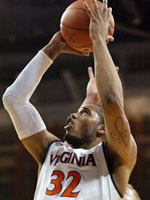 |
|
Scott has been pleased with his role in Coach Bennett’s system. |
 Mike Ingalls: Were you afraid you might not fit in well with Bennett’s system? Did you have concerns you might not be utilized the way you’d like?
Mike Ingalls: Were you afraid you might not fit in well with Bennett’s system? Did you have concerns you might not be utilized the way you’d like?
Mike Scott: Nah. I just think he worked with what he had. His Washington State teams didn’t have any low post scorers. He just went with his horses, and I think that was mostly from the perimeter. That’s not the case now [with UVa]. It’s not like the perimeter takes all of the shots now. It’s rationed out. Everyone has their freedom.
 Mike Ingalls: What do you think about your role now and the system that’s in place?
Mike Ingalls: What do you think about your role now and the system that’s in place?
Mike Scott: I still think I can be a low post scorer, be a perimeter scorer, be a rebounder, and be a vocal leader and captain.
 Mike Ingalls: Are you happy with your place in this new system?
Mike Ingalls: Are you happy with your place in this new system?
Mike Scott: Oh, yeah. Definitely. And it’s me having more confidence in myself to show more parts of my game – and there’s still more to come. Next year there will be more to my game. I’ll be more into the offense than right now.
 Mike Ingalls: Who would you say has been the most influential assistant coach (under either head coach) for you and why?
Mike Ingalls: Who would you say has been the most influential assistant coach (under either head coach) for you and why?
Mike Scott: I’d have to say between Coach McKay and Rick Brunson, who was under Coach Leitao. Both of those coaches kept it real with me. For example, Rick is like an uncle you can go to. He would come to me, talk to me – going through with Coach Leitao and being frustrated – he was always like, “It will be alright. Just keep your head on straight.” He would always talk to me, Jeff or Mu.
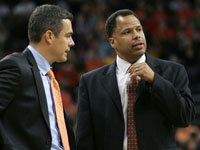 |
|
Coach Bennett and McKay, along with position coaches Jason Williford and Mark Sanchez, have given Scott the confidence to become one of the top players in the ACC. |
 Mike Ingalls: What about your development as a player? Who has helped you in that regard?
Mike Ingalls: What about your development as a player? Who has helped you in that regard?
Mike Scott: Coach McKay. He compares me to Danny Granger, a guy he had at New Mexico. He’d always say, “Mike, you’re way better than Danny. Way better. But the difference between you and Danny, Danny could guard the one through five.” That’s why he’s always telling me to get quicker, get stronger – expanding my game and being more than just a back to the basket player.
 Mike Ingalls: Jason Williford is your position coach. How is your relationship with him?
Mike Ingalls: Jason Williford is your position coach. How is your relationship with him?
Mike Scott: Very good. I love going against him. He fouls me all the time, though. He says it’s never a foul, but 99 percent of the time he’s fouling me. He’s another great UVa alum. Just coming back to the school with the passion that he still has, you would think he’s still playing college basketball. For example, he’s always loud, always talking. When we play against a scout team, he’ll be on the other team – he’s talking. I just try to learn from him, be that ‘vocal’ leader that he is.
 Mike Ingalls: The two new revenue sports coaches, Bennett and football coach Mike London, are lining their staffs with ex-players, notable players in UVa’s history. Do you believe it’s a good thing to bring in ex-players, even if recruits have never seen them play?
Mike Ingalls: The two new revenue sports coaches, Bennett and football coach Mike London, are lining their staffs with ex-players, notable players in UVa’s history. Do you believe it’s a good thing to bring in ex-players, even if recruits have never seen them play?
Mike Scott: Oh, yeah. Most definitely. [Williford] is from Virginia, from Richmond. So he knows the area. He’s always near my area. From a recruiting standpoint, that’s a plus.
 Mike Ingalls: Does it mean anything to have these players back at the program, knowing they’ve walked the walk at UVa?
Mike Ingalls: Does it mean anything to have these players back at the program, knowing they’ve walked the walk at UVa?
Mike Scott: Most definitely. Mr. Cory Alexander – we listen to his stories all the time. We listen to Mike Curtis’s stories. We listen to Coach Williford’s stories. They just tell us how it felt when Coach Williford and Coach Curtis were on that Elite 8 team – what it felt like to get to the Big Dance and be a part of that.
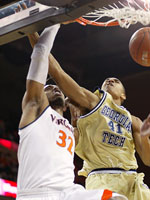 |
|
Scott provides a poster opportunity with a dunk over Georgia Tech’s Glen Rice, Jr. |
 Mike Ingalls: When you signed with UVa, did you believe you’d one day become All-ACC material or was this a decision more about getting a degree from UVa and playing a role on the team?
Mike Ingalls: When you signed with UVa, did you believe you’d one day become All-ACC material or was this a decision more about getting a degree from UVa and playing a role on the team?
Mike Scott: It’s always great to have a good education, especially from here. But I definitely always wanted to be one of the best players in the league. Right now I have to be one of the best players in this league. I have to push myself to believe I’m going to be.
 Mike Ingalls: When did you first realize that you could play on that stage? Was it during the summer you played with Boo Williams?
Mike Ingalls: When did you first realize that you could play on that stage? Was it during the summer you played with Boo Williams?
Mike Scott: Yeah, playing with Boo Williams and playing at Hargrave. It basically started my confidence up. It started separating me from others.
 Mike Ingalls: You were playing with guys heading to UNC, Kentucky, etc. and …
Mike Ingalls: You were playing with guys heading to UNC, Kentucky, etc. and …
Mike Scott: … and doing pretty good.
 Mike Ingalls: What were your goals coming out of Hargrave?
Mike Ingalls: What were your goals coming out of Hargrave?
Mike Scott: Obviously, to learn and not try to come in and think I’m going to run the show as a freshman, especially on a team with Sean Singletary . I basically just tried to learn from him and know my role. I’m young, have a lot to learn with this league – basically just to become a student of the game.
 Mike Ingalls: Who have you bonded with the most on the various teams while here?
Mike Ingalls: Who have you bonded with the most on the various teams while here?
Mike Scott: The people I came here with; Mu, Sammy – those two. But I take all of my teammates under my wing. Close with Jontel, he’s my roommate. Definitely close with Assane. But the guys I came in with – Mustapha, Sam, and Will Sherrill, of course. We’ve all three been here together for the longest.
 Mike Ingalls: Is it typical to bond with the class you came in with?
Mike Ingalls: Is it typical to bond with the class you came in with?
Mike Scott: Yeah.
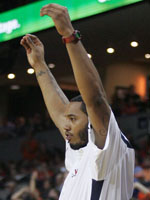 |
|
Scott cheers as friend and classmate Sammy Zeglinski knocks down a 3-pointer. |
 Mike Ingalls: Well, at least you get to go out with Sammy by your side, rather than being the only old man from that class still hanging around.
Mike Ingalls: Well, at least you get to go out with Sammy by your side, rather than being the only old man from that class still hanging around.
Mike Scott: It’s definitely fun knowing that I’m the third oldest man in college basketball. That guy at Florida State is the oldest. How old is he? 26? Sammy’s like 25, and I’m 22. July I turn 23.
 Mike Ingalls: Who has been the most difficult player to defend in practice?
Mike Ingalls: Who has been the most difficult player to defend in practice?
Mike Scott: I would say Jerome Meyinsse . A lot of people didn’t know that Jerome was very talented. And going back to how different people react to Coach Leitao’s coaching, he just didn’t show it because he didn’t have the confidence to show it. But, he’s back from Argentina and I was playing against him one on one this past week or so, he’s just gotten so much better. He’s tough to defend because he’s so strong, he has good footwork, and he’s explosive.
 Mike Ingalls: Who is the best player you’ve ever played against?
Mike Ingalls: Who is the best player you’ve ever played against?
Mike Scott: I would probably say Trevor Booker. I was taller than him, but still – and he’s a lefty big man. He’s intense. When he dunks it’s like he’s mad at the rim – trying to break the rim.
 Mike Ingalls: Who was your favorite player growing up?
Mike Ingalls: Who was your favorite player growing up?
Mike Scott: I think everybody wanted to be Michael Jordan. But I started following LeBron his junior year in high school and ever since then I’ve been a fan. I saw him when he played in the Capital Classic. It was him, Chris Paul, Charlie Villanueva – all on the same team. I was like, ‘Wow.’
 Mike Ingalls: Did you try to model your game after anyone in particular, LeBron?
Mike Ingalls: Did you try to model your game after anyone in particular, LeBron?
Mike Scott: LeBron, because he could play point. My dad used to play me as point guard because I was tall and could handle the ball. Just seeing how versatile he was. He was one of the tallest players on his team. Growing up I was always one of the tallest players on my team and coaches would be like, “Put him at center – let him stay in there and rebound and block shots,” not even knowing that I could do more than that. So, just seeing someone like LeBron being tall and being able to do so much …
 Mike Ingalls: What is your best memory on the court?
Mike Ingalls: What is your best memory on the court?
Mike Scott: An individual play last year where I alley-ooped the ball to myself. I don’t know what I was thinking, I just had a wide open fast break dunk and I didn’t want to do anything regular.
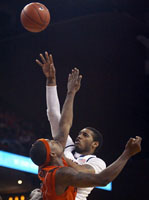 |
|
Scott taking a shot against Virginia Tech. |
 Mike Ingalls: What’s the most memorable game for you while at Virginia?
Mike Ingalls: What’s the most memorable game for you while at Virginia?
Mike Scott: I’d have to say at Virginia Tech this past year. That was my first win ever there. Until this year [since Scott has been on the team], we haven’t swept Tech, and haven’t beaten Tech at Tech.
 Mike Ingalls: What is your best memory off the court?
Mike Ingalls: What is your best memory off the court?
Mike Scott: Basically any memories with my teammates, just joking around. There are so many memories with my teammates.
 Mike Ingalls: You were Southern Cal champion in the 400m, second in the long jump and third in the 800m when you were 9 years old. When did you decide to focus on hoops and leave the track world behind?
Mike Ingalls: You were Southern Cal champion in the 400m, second in the long jump and third in the 800m when you were 9 years old. When did you decide to focus on hoops and leave the track world behind?
Mike Scott: I think it was the summer [just after winning the 400m]. I was supposed to go to this AAU thing called the Junior Olympics, held in Charlotte. All the best track athletes go to this – basically the best runners in the nation. But, I went to my mom’s that summer in D.C. and didn’t go to the track meet. I just decided to start [focusing more] on basketball. I still ran track afterwards, it’s just my heart and mind wasn’t in it.
 Mike Ingalls: When did you start to explode with your height where you realized basketball was a better option than track?
Mike Ingalls: When did you start to explode with your height where you realized basketball was a better option than track?
Mike Scott: In the eighth grade I was 6’1″, and over that summer I grew three inches. So at the end of my ninth grade year I was 6’4″.
 Mike Ingalls: Were there any other sports you were interested in, and when did basketball become your primary focus?
Mike Ingalls: Were there any other sports you were interested in, and when did basketball become your primary focus?
Mike Scott: I did volleyball my freshman year of high school. But that didn’t work out. I just did it because my volleyball coach said it helps you jump and prepare for basketball. I didn’t play that long, really. I also played soccer. That’s my second sport, and pretty good at it.
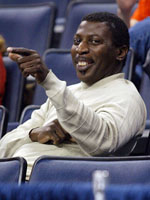 |
|
Mike’s father, Michael H. Scott, attends nearly every home game to support his son. |
 Mike Ingalls: Who was your biggest influence growing up?
Mike Ingalls: Who was your biggest influence growing up?
Mike Scott: Definitely my father.
 Mike Ingalls: What was it like growing up with a Marine father? Why was he such a positive influence for you?
Mike Ingalls: What was it like growing up with a Marine father? Why was he such a positive influence for you?
Mike Scott: Just that military discipline to stay hard on me ’til this day. Of course he has eased up a little bit – I’m old and grown. He just stayed hard on me every single day, made sure I hung out with the right crowd. I was one of those kids when everyone went to the party, but I couldn’t go to the party. Dad was like, “Nah, I don’t know them.” He made sure I had a curfew. My curfew was 12 o’clock on the weekends. Staying hard on me and staying tough on me is what made me what I am today.
 Mike Ingalls: Did your father play basketball with you were you were young?
Mike Ingalls: Did your father play basketball with you were you were young?
Mike Scott: Yeah, he did. He still does. He still tries to rough me up. Anything that makes me tougher, that’s what he does.
 Mike Ingalls: Did you move around much? What places have you lived as a result?
Mike Ingalls: Did you move around much? What places have you lived as a result?
Mike Scott: I was small, so you’d have to ask him about that. I remember he was stationed at Quantico [Virginia] and we drove from Quantico to Camp Pendleton in California [Oceanside, north of San Diego] in the car. I was four or five [he was actually six years old]. It probably took about four days. After he retired, we came back after my third grade year and stayed here in Virginia. I was in Virginia from the fourth grade on.
 Mike Ingalls: Talk about the support your father has given you throughout your college journey. He seems to make most every game.
Mike Ingalls: Talk about the support your father has given you throughout your college journey. He seems to make most every game.
Mike Scott: It’s very important. He definitely wants to be there for me. I think it’s why he pushed me so hard, so that I can go on and teach my sons and daughters the same way he taught me. Till this day he stands behind me. I appreciate all of that. I get mad when he’s not there, but I understand he can’t make it to road games.
 Mike Ingalls: He mentioned working you out during the offseason to keep you into shape. What kind of workouts did you do with your father when not at UVa?
Mike Ingalls: He mentioned working you out during the offseason to keep you into shape. What kind of workouts did you do with your father when not at UVa?
Mike Scott: He used to make me run around the block. If I ran around it one time, it would be equal to two laps – equal to an 800 [meters]. He used to make me do that twice. He would take me out to the football field and do dribbling drills. I think he learned that from a guy named Mark Macon who used to play for Temple – Shakin’ Bakin’ Mark Macon. He said that if you want to improve your dribbling skills, do it on the football field because you hit those grass spots where the ball is going to go all over the place – but you have to have that control.
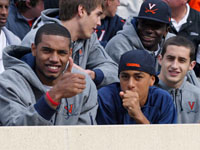 |
|
Scott hanging with teammates at a UVa Football game. |
 Mike Ingalls: When you’re not playing basketball or dealing with academics, what are you most likely doing to entertain yourself?
Mike Ingalls: When you’re not playing basketball or dealing with academics, what are you most likely doing to entertain yourself?
Mike Scott: Just hanging around my teammates – Jontel and Mu. No disrespect to Charlottesville, but there’s only so much you can do here. We just try to find things to do – like play pranks on the freshmen [smiling]. Just dumb stuff to mess with them. We mess with Assane. He lives by himself, so we like to go mess with him.
 Mike Ingalls: You know, Tunji Soroye is still living in Charlottesville. You ever go hang out at his place?
Mike Ingalls: You know, Tunji Soroye is still living in Charlottesville. You ever go hang out at his place?
Mike Scott: [Laughing] You’re going to have to tell this story – I’m putting everybody out. One time it was me, Mamadi Diane , Jontel, Solomon Tat , Assane, and I think Mu was with us. This goes back to Tunji’s senior year. We were going to O-Hill for something and he left us. We needed a ride and didn’t have any cars, and he left us. We were real mad. So we went to O-Hill and got some ice cream, then went to his car and smeared the ice cream all over his windshield and car – right when he was taking the trash out, he caught us. He chased us. Basically we tormented him, doing whatever we could to make him mad so he would chase us. We got silly string from CVS and silly stringed his car up last summer. He chased us with his dog. It was funny, we ran. Tunji keeps a low profile and doesn’t like to go out much with us. That’s why we like to mess with him and prank him.
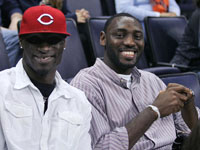 |
|
Solomon Tat and Tunji Soroye continue to stay close with Mike Scott and their former team. |
 Mike Ingalls: Besides the episodes with Tunji, what’s the crazy prank you pulled on someone?
Mike Ingalls: Besides the episodes with Tunji, what’s the crazy prank you pulled on someone?
Mike Scott: [Smiling] Well, it’s spring break and no one is here besides us. I get a call from Sammy and he’s like, “Someone just egged our window.” They have a sliding door and live on the second floor. I was like, “Are you serious?” While I’m on the phone, I hear something splatter against our door [at Copeley], my windows, and Jontel’s windows. I hung up the phone and was like [to Jontel], “Did you just hear that?” He was like, “Yeah, sound like eggs.” I didn’t want to open the door, so I got down on the ground to look through the little crack under the door and saw slimy things coming down from the door. So I open the door and there were eggs all over our door. I was like, “Wow, that’s crazy. Sammy just told me that someone egged him.” We were like, “Freshmen.” We both said it at the same time. So we went to Kroger and bought a bunch of eggs. We got Doug, who wasn’t involved, to call the freshmen to come outside of their rooms and just lit them up.
 Mike Ingalls: Which freshmen egged you?
Mike Ingalls: Which freshmen egged you?
Mike Scott: It was all six of them [Harris, Harrell, Baron, Regan, Mitchell and Johnson].
 Mike Ingalls: You mentioned to me that you graduate in the fall. How many courses do you have left to complete?
Mike Ingalls: You mentioned to me that you graduate in the fall. How many courses do you have left to complete?
Mike Scott: I only have one more requirement, and I’ll take that in the fall.
 Mike Ingalls: You didn’t want to complete this and graduate with your class this spring?
Mike Ingalls: You didn’t want to complete this and graduate with your class this spring?
Mike Scott: I put it aside for the fall because my semester was already too hectic. Even before I realized I was going to stay [another year], I thought my semester was already too crazy. I put it aside so that I could really focus on that last requirement.
 Mike Ingalls: What does it mean to get a degree from UVa?
Mike Ingalls: What does it mean to get a degree from UVa?
Mike Scott: It means a lot. I think I’ve earned it – I’ve been here for nine years [smiles].
 Mike Ingalls: Nine years?
Mike Ingalls: Nine years?
Mike Scott: Feels like nine … dog years [laughing]. In all seriousness, I’ve been through a lot. It will be great to have a degree from here.
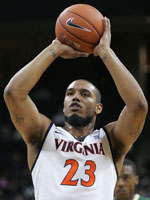 |
|
Scott will retain jersey number 23 for his fifth year. |
 Mike Ingalls: Are you considering a jersey number change for your fifth year, or are you sticking with No. 23?
Mike Ingalls: Are you considering a jersey number change for your fifth year, or are you sticking with No. 23?
Mike Scott: [Laughs] No, I’m going to keep #23.
 Mike Ingalls: Wait, LeBron is No. 6 now. You told me all of this about LeBron, and now you’re back with Michael Jordan’s number. What number did you wear in high school?
Mike Ingalls: Wait, LeBron is No. 6 now. You told me all of this about LeBron, and now you’re back with Michael Jordan’s number. What number did you wear in high school?
Mike Scott: 30 in high school and 31 with Boo. I was 32 at Hargrave and that’s why I was 32 my freshman, sophomore and junior years [at UVa]. I wanted to be 30, but Adrian Joseph was here.
 Mike Ingalls: What made you change from 32 to 23.
Mike Ingalls: What made you change from 32 to 23.
Mike Scott: I think after Jeff [Jones] left. He was my best friend. I was going to keep Jones going, and LeBron was 23 at the time and my favorite player.
 Mike Ingalls: Are there any limitations or guidelines that the staff puts on athletes when it comes to social media like Facebook and Twitter?
Mike Ingalls: Are there any limitations or guidelines that the staff puts on athletes when it comes to social media like Facebook and Twitter?
Mike Scott: Just be smart. Don’t do anything crazy. We don’t have any problems with that on this team anyway. I joke a lot on Twitter, but I’m not going to say anything crazy or tragical [smiles].
 Mike Ingalls: What caused that social media outburst a couple of years ago? Was that based on fan support, frustration, etc.?
Mike Ingalls: What caused that social media outburst a couple of years ago? Was that based on fan support, frustration, etc.?
Mike Scott: Frustration with how the season was going and frustration with how the fans seemed like they were giving up on us.
 Mike Ingalls: When you tweet SMH, are you actually shaking your head?
Mike Ingalls: When you tweet SMH, are you actually shaking your head?
Mike Scott: Yes, I am. I’m shaking my head when I’m tweeting that.

